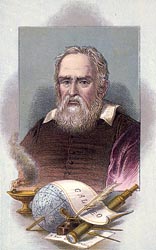The Galileo Myth

The Vatican issued a statement today praising Galileo as “a believer who tried, in the context of his time, to reconcile the results of his scientific research with the tenets of the Christian faith.”
The statement is intended, in part, to recognize Galileo’s immense scientific accomplishments in the field of astronomy.
It also serves as an apology for errors in the way the Church treated Galileo and his research while the 17th-century astronomer was alive.
But the release of the Vatican statement, released in conjunction with this year’s International Year of Astronomy commemorating the 400th anniversary of Galileo’s first discoveries using a telescope to study the night sky, is also a good time to correct the historical record about the relationship between Galileo and the Church.
And more generally, to correct the false claim that Galileo was only one of the victims of the permanent hostility that allegedly exists between faith and science, according to prominent atheists like Richard Dawkins and Christopher Hitchens.
That’s just what Dinesh D’Souza did in his article “Debunking the Galileo Myth,” originally written in November 2007 and recently reposted at the useful Catholic Education Resource Center website.
D’Souza’s article provides a point-by-point rebuttal of common myths about Galileo and Charles Darwin that are often cited in support of the premise of a permanent war between faith and science.
Sums up D’Souza, “Historian Gary Ferngren concludes that ‘the traditional picture of Galileo as a martyr to intellectual freedom and as a victim of the church’s opposition to science has been demonstrated to be little more than a caricature.’ Remember this the next time you hear some half-educated atheist rambling on about ‘the war between religion and science.’”











